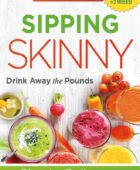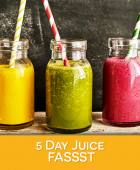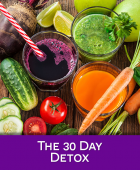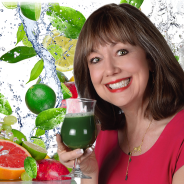Why Organic?

 I’m often asked if organic produce is more nutritious than conventionally grown food. Studies have shown that it is. According to results from a $25-million study into organic food–the largest of its kind to date, organic completely outshines conventional produce. A four-year, European-Union-funded study found that organic fruit and vegetables contain up to 40 percent more antioxidants. They have higher levels of beneficial minerals like iron and zinc. Milk from organic herds contained up to 90 percent more antioxidants. The researchers obtained their results after growing fruit and vegetables, and raising cattle, on adjacent organic and non-organic sites. They say that eating organic foods can even help to increase the nutrient intake of people who don’t eat the recommended five servings of fruits and vegetables a day.
I’m often asked if organic produce is more nutritious than conventionally grown food. Studies have shown that it is. According to results from a $25-million study into organic food–the largest of its kind to date, organic completely outshines conventional produce. A four-year, European-Union-funded study found that organic fruit and vegetables contain up to 40 percent more antioxidants. They have higher levels of beneficial minerals like iron and zinc. Milk from organic herds contained up to 90 percent more antioxidants. The researchers obtained their results after growing fruit and vegetables, and raising cattle, on adjacent organic and non-organic sites. They say that eating organic foods can even help to increase the nutrient intake of people who don’t eat the recommended five servings of fruits and vegetables a day.
Beyond Organics - JOIN US!
They include:
 Grassfed (and finished) Beef that is organic, kosher, slaughtered in the ancient, more compassionate way, and not slaughtered until CLA levels are high. (Grain fed cattle has virtually no CLA.)
Grassfed (and finished) Beef that is organic, kosher, slaughtered in the ancient, more compassionate way, and not slaughtered until CLA levels are high. (Grain fed cattle has virtually no CLA.)
 Raw Organic Cheese. Beyond Organics cheese is actually raw, as opposed to the not-exactly “raw” cheese you find at health stores that are pasteurized to just a degree below legal pasteurization—meaning they’re not really raw. Beyond Organic cheese is truly raw, and probiotic infused. They also contain nothing artificial (including coloring). Every two ounces of cheese is the equivalent of taking a probiotic supplement.All the dairy products are from a type of dairy cow that doesn’t produce a cassein protein that is produced by most dairy cows, which we don’t tolerate well. The cheese is also considered “farmstead” meaning they are made on the same farm on which the diary was collected. And, they are artisanal, meaning they’re made in small batches to ensure taste and quality.
Raw Organic Cheese. Beyond Organics cheese is actually raw, as opposed to the not-exactly “raw” cheese you find at health stores that are pasteurized to just a degree below legal pasteurization—meaning they’re not really raw. Beyond Organic cheese is truly raw, and probiotic infused. They also contain nothing artificial (including coloring). Every two ounces of cheese is the equivalent of taking a probiotic supplement.All the dairy products are from a type of dairy cow that doesn’t produce a cassein protein that is produced by most dairy cows, which we don’t tolerate well. The cheese is also considered “farmstead” meaning they are made on the same farm on which the diary was collected. And, they are artisanal, meaning they’re made in small batches to ensure taste and quality.
 Probiotic infused water. Reign Supreme Mountain Spring Water originates from Jordan’s pristine clear blue spring. It comes from a quartz vein below the earth’s crust bubbling to the surface filtered. Jordan says, “Our dependence and even addiction to the existing industrial food machine has led to a disastrous “dis-connect” between us and our FOOD. We are at a critical crossroads as a nation and our current path is NOT SUSTAINABLE—in any sense of the word.”
Probiotic infused water. Reign Supreme Mountain Spring Water originates from Jordan’s pristine clear blue spring. It comes from a quartz vein below the earth’s crust bubbling to the surface filtered. Jordan says, “Our dependence and even addiction to the existing industrial food machine has led to a disastrous “dis-connect” between us and our FOOD. We are at a critical crossroads as a nation and our current path is NOT SUSTAINABLE—in any sense of the word.”
He is committed to sustainable farming and ranching. With food prices rising and possibilities looming of food shortages, I think it’s imperative to have your name on this list so that you can order these pure, organic foods that are raised in a sustainable manner whenever you wish. You’ll be on the ground floor, should there ever be a cut-off point where no new customers are accepted. I only say this because recently I was told by one of my organic food product suppliers that they are accepting no new customers because there is a shortage of that product.
I’m on the list of buyers and don’t have to worry, but what about the people who want the product and can’t get it? That led me to think about the possibility of other food shortages. Have you every wondered what would happen to you or your family if the three to four days worth of groceries at your local supermarket were not replenished? What would you do for food? What if your water supply was cut off? Signing up now is “By Invitation Only,” and is not open to the general public until October of this year.
I’m inviting you to sign up using my code, which is 0000000746. When you sign up at no cost, there will be special compensation incentives that will last only until the launch in October. It costs you nothing but a few minutes of your time. And if you would like to consider this Mission Marketing opportunity for a business, then tell your family and friends to sign up as well under your code. If you want to become a Preferred Customer or a Mission Marketer (and make this a business) you can get more information about enrolling here — http://cheriecalbom.mybeyondorganic.com/Web/us/en/business-enroll.dhtml To order products, go to http://cheriecalbom.mybeyondorganic.com/Web/us/en/index.dhtml














